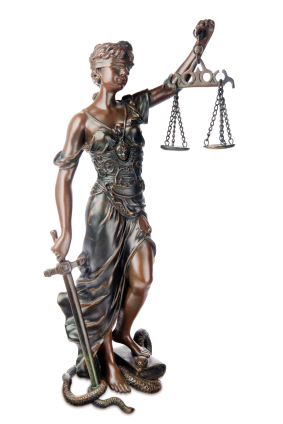Prosecutorial misconduct has become an ugly commonplace of modern government, manipulating the legal system to attack easy political targets. So some good news: The courts may dismantle a California settlement that was a product of fraud by prosecutors.
The story began in 2007 with the Moonlight Fire in California that burned some 65,000 acres, about two-thirds on federal land. Within 48 hours and while the flames were still burning, the state's department of forestry and fire protection, known as Cal Fire, and the U.S. Forest Service blamed the disaster on Sierra Pacific, a Redding-based company that owns some 1.2 million acres of timberland.
In 2009 a federal-state task force brought official complaints against the company and nearby landowners. California officials filed an action in state court while prosecutors sued for $1 billion in federal court. Sierra Pacific has insisted it didn't start the fire but, faced with an open-ended legal fight, the company in 2012 settled the federal case for $55 million and a deed of some 22,500 acres to the U.S. government.
 But the state case continued, and it has exposed a fiasco of fraud and corruption so significant that the company is seeking to have the federal settlement overturned. Among other problems, government investigators and prosecutors doctored reports, misrepresented facts and retaliated against employees whose questions threatened their strategy.
But the state case continued, and it has exposed a fiasco of fraud and corruption so significant that the company is seeking to have the federal settlement overturned. Among other problems, government investigators and prosecutors doctored reports, misrepresented facts and retaliated against employees whose questions threatened their strategy.According to the theory implicating the company, the fire started when the blade of a Sierra Pacific bulldozer hit a rock and created a spark. Government investigators pinpointed a location and claimed they had confirmation from a bulldozer driver. Problem was, both the fire's alleged point of origin and the scenario to buttress it were fraudulent. When the company questioned the bulldozer driver, he denied having made the statement and admitted he couldn't have confirmed the statement prosecutors had him sign because he didn't know how to read.
Prosecutors were also dishonest about where the fire started. Overhead videos have shown that the point of origin marked by the government was well outside the visual boundaries of the burning forest nearly an hour after the fire started.
Leading the federal fire investigation was then-head of the Eastern District of California's Affirmative Fire Litigation Team, Robert Wright. A specialist in fire litigation, Mr, Wright says in a 15-page declaration in federal court that prosecutors withheld material information in the case, including a change in the fire's stated point of origin.
Mr. Wright says he also discovered an error in calculating the damage of part of a separate wildfire, which reduced the potential liability to $15 million from $25 million. Mr. Wright felt he was under a professional obligation to disclose the document, and he confirmed this with the Justice Department's Professional Responsibility Advisory Office. But he says his boss, Civil Chief David Shelledy, pushed back, saying, "That's a beginning. Now what can you do to avoid creating an ethical obligation to volunteer a harmful document."
When Mr. Wright disclosed it anyway, he says he was kicked off the Moonlight Fire case by Mr. Shelledy, days after he received a commendation for his performance on another case by U.S. Attorney Benjamin Wagner. Mr. Shelledy declined to comment, but Mr. Wagner told us that "we very strongly disagree with the assertions" made by Mr. Wright, "particularly insofar as they allege misconduct by individual AUSAs and retaliation by our office against a former employee."
Mr. Wagner adds that Mr. Shelledy was "recently awarded the Attorney General's Award for Distinguished Service from Attorney General Holder. "
A second federal prosecutor, Eric Overby, joined the case in 2011, only to withdraw promptly on discovering what he called prosecutorial abuse directed squarely at raising revenue. He told defense counsel that in "my entire career, I have never seen anything like this. Never."
In February 2014, California state Judge Leslie Nichols assailed the federal and state government for abuses of discovery so "reprehensible" and "egregious" that they "threatened the integrity of the judicial process." He threw out the case and awarded Sierra Pacific $30 million in sanctions against Cal Fire.
If that seems like a large number, the judge noted, the prosecutors were out to "win at any cost." Defendants had to uncover layers of governmental corruption, Judge Nichols continued. "The cost of Plaintiff Cal Fire's conduct is too much for the administration of justice to bear."
The case is growing in infamy. In October, Sierra Pacific filed a motion before federal judge Kimberly Mueller under rule 60(d) to vacate the settlement on grounds that it had been reached as the result of fraud on the court. The case was then removed from Judge Mueller and reassigned to a new judge, William Shubb, who will hear the next phase of the case.
That move acknowledges a legal fraud that could burn down the courthouse, not to mention the reputation of the government's fire investigators and the federal prosecutors pursuing a payday. Judge Shubb has an obligation to sanction these legal abuses with enough force that prosecutors across the country get the message.
By Wall Street Journal
Source: The Wall Street Journal
No comments:
Post a Comment
I thank for the comment!